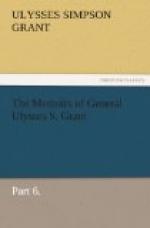He would have proven the best friend the South could have had, and saved much of the wrangling and bitterness of feeling brought out by reconstruction under a President who at first wished to revenge himself upon Southern men of better social standing than himself, but who still sought their recognition, and in a short time conceived the idea and advanced the proposition to become their Moses to lead them triumphantly out of all their difficulties.
The story of the legislation enacted during the reconstruction period to stay the hands of the President is too fresh in the minds of the people to be told now. Much of it, no doubt, was unconstitutional; but it was hoped that the laws enacted would serve their purpose before the question of constitutionality could be submitted to the judiciary and a decision obtained. These laws did serve their purpose, and now remain “a dead letter” upon the statute books of the United States, no one taking interest enough in them to give them a passing thought.
Much was said at the time about the garb Mr. Davis was wearing when he was captured. I cannot settle this question from personal knowledge of the facts; but I have been under the belief, from information given to me by General Wilson shortly after the event, that when Mr. Davis learned that he was surrounded by our cavalry he was in his tent dressed in a gentleman’s dressing gown. Naturally enough, Mr. Davis wanted to escape, and would not reflect much how this should be accomplished provided it might be done successfully. If captured, he would be no ordinary prisoner. He represented all there was of that hostility to the government which had caused four years of the bloodiest war—and the most costly in other respects of which history makes any record. Every one supposed he would be tried for treason if captured, and that he would be executed. Had he succeeded in making his escape in any disguise it would have been adjudged a good thing afterwards by his admirers.
As my official letters on file in the War Department, as well as my remarks in this book, reflect upon General Thomas by dwelling somewhat upon his tardiness, it is due to myself, as well as to him, that I give my estimate of him as a soldier. The same remark will apply also in the case of General Canby. I had been at West Point with Thomas one year, and had known him later in the old army. He was a man of commanding appearance, slow and deliberate in speech and action; sensible, honest and brave. He possessed valuable soldierly qualities in an eminent degree. He gained the confidence of all who served under him, and almost their love. This implies a very valuable quality. It is a quality which calls out the most efficient services of the troops serving under the commander possessing it.
Thomas’s dispositions were deliberately made, and always good. He could not be driven from a point he was given to hold. He was not as good, however, in pursuit as he was in action. I do not believe that he could ever have conducted Sherman’s army from Chattanooga to Atlanta against the defences and the commander guarding that line in 1864. On the other hand, if it had been given him to hold the line which Johnston tried to hold, neither that general nor Sherman, nor any other officer could have done it better.




